The Frances Ingram Papers, 1894-1953
By Jacob F. Lee
H.F. Boehl Summer Intern
About |
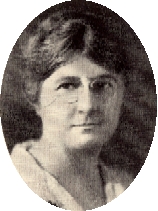 A recent addition to The Filson’s growing twentieth-century manuscript collection are the papers of
Louisville social worker Frances Ingram (1874-1954). Consisting of correspondence, pamphlets,
sociological reports, newspaper clippings, and lectures, Ingram’s papers thoroughly document Louisville’s
early-twentieth century reform movements.
A recent addition to The Filson’s growing twentieth-century manuscript collection are the papers of
Louisville social worker Frances Ingram (1874-1954). Consisting of correspondence, pamphlets,
sociological reports, newspaper clippings, and lectures, Ingram’s papers thoroughly document Louisville’s
early-twentieth century reform movements.
A graduate of Louisville Girls’ High School, Louisville Normal School, and the University of Louisville, Frances Ingram became the Head Resident of Neighborhood House, a Louisville settlement home, in 1905. Additionally, Ingram sat on the boards of the Louisville-Jefferson County Children’s Home and the Louisville Industrial School of Reform and was a member of numerous national, state, and local social work organizations. As a result, she corresponded with such notable reformers as Jane Addams, John Dewey, and Mary Anderson, the Director of the Department of Labor’s Women’s Bureau.
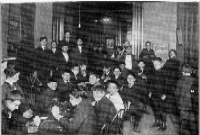 From 1905 to 1939, Ingram served
as Head Resident of Louisville’s Neighborhood
House social settlement, now
located in Portland. Originally operating
in a neighborhood on First Street,
the settlement house served several
functions. It worked with “local, state
and national agencies for reform and
protective measures,” managed playgrounds
and other facilities, and served
“as a non-sectarian meeting place for
[the] neighborhood.” The Ingram
Papers at The Filson contain a number
of documents related to the everyday
activities of Neighborhood
House. The nature of the
community surrounding
Neighborhood
House and Ingram’s
intimate contact
with its residents
encouraged her
to focus on two
major issues
during her career:
Americanization
and child welfare.
In addition
to the day-to-day
administration of
Neighborhood House,
Ingram also worked to
acclimate immigrants to Louisville
society. Working mainly with Syrian,
Italian, and German immigrants,
Ingram and Neighborhood House held
citizenship classes to teach prospective
citizens the history of the United States
and the tenets of democracy. Although
other citizenship classes existed in the
early-1900s, Neighborhood House’s
class was the only one like it operating
in the state by the 1930s. Financed in
part and encouraged by local chapters
of the American Legion, Daughters of
the American Revolution, and other
similar organizations, the citizenship
classes enabled foreign-born residents
of Louisville to earn their first set of
papers and eventually become citizens.
The Ingram Papers contain correspondence,
speeches, and articles related
to this Americanization process in
Louisville and across the country.
From 1905 to 1939, Ingram served
as Head Resident of Louisville’s Neighborhood
House social settlement, now
located in Portland. Originally operating
in a neighborhood on First Street,
the settlement house served several
functions. It worked with “local, state
and national agencies for reform and
protective measures,” managed playgrounds
and other facilities, and served
“as a non-sectarian meeting place for
[the] neighborhood.” The Ingram
Papers at The Filson contain a number
of documents related to the everyday
activities of Neighborhood
House. The nature of the
community surrounding
Neighborhood
House and Ingram’s
intimate contact
with its residents
encouraged her
to focus on two
major issues
during her career:
Americanization
and child welfare.
In addition
to the day-to-day
administration of
Neighborhood House,
Ingram also worked to
acclimate immigrants to Louisville
society. Working mainly with Syrian,
Italian, and German immigrants,
Ingram and Neighborhood House held
citizenship classes to teach prospective
citizens the history of the United States
and the tenets of democracy. Although
other citizenship classes existed in the
early-1900s, Neighborhood House’s
class was the only one like it operating
in the state by the 1930s. Financed in
part and encouraged by local chapters
of the American Legion, Daughters of
the American Revolution, and other
similar organizations, the citizenship
classes enabled foreign-born residents
of Louisville to earn their first set of
papers and eventually become citizens.
The Ingram Papers contain correspondence,
speeches, and articles related
to this Americanization process in
Louisville and across the country.
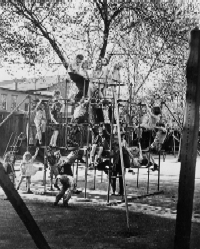 Although Americanization was
an important part of Neighborhood
House’s programs, the issue of child
welfare was Ingram’s primary concern.
Through her social work, Ingram
witnessed the underbelly of Louisville
society, and she worked to protect
Louisville’s youths from the city’s vices.
In her continuous efforts to better conditions
for the city’s children, Ingram
worked to establish a series of parks
and playgrounds, which would provide
places for youths to spend their
recreation time rather than in dance
halls or the vice district providing
opportunities for Louisville’s youths to
be involved in more acceptable activities,
including music and drama clubs,
Neighborhood House hoped to shelter
the city’s children from the “demoralizing influences” of drinking, drug
abuse, and prostitution.
Although Americanization was
an important part of Neighborhood
House’s programs, the issue of child
welfare was Ingram’s primary concern.
Through her social work, Ingram
witnessed the underbelly of Louisville
society, and she worked to protect
Louisville’s youths from the city’s vices.
In her continuous efforts to better conditions
for the city’s children, Ingram
worked to establish a series of parks
and playgrounds, which would provide
places for youths to spend their
recreation time rather than in dance
halls or the vice district providing
opportunities for Louisville’s youths to
be involved in more acceptable activities,
including music and drama clubs,
Neighborhood House hoped to shelter
the city’s children from the “demoralizing influences” of drinking, drug
abuse, and prostitution.
In 1933, when the Jefferson County White House Conference prepared a report on “Youth Outside of Home and School,” its members visited thirty pool rooms in Louisville to investigate children’s easy access to such locations. The reporters found swearing, drinking, pool-shooting children in almost all the establishments examined. The Youth Outside of Home and School Committee, chaired by Ingram, deemed only four of the thirty pool rooms “suitable places for men and boys,” and they found three of the pool rooms so despicable as to report them to the Directors of Safety and Health. Although the report contained a summary of findings, the Ingram Papers at The Filson include the complete results of the investigation and descriptions of the halls inspected. The investigators’ reports provide detailed accounts of “prostitutes, drink, and suggestive dancing [that] were the dominating features” of the seedier pool halls.
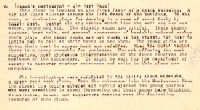 In addition to pool rooms, Louisville’s
dance halls concerned Ingram.
During World War I, Ingram served as
Chairman of the Welfare Committee of
the War Recreation Board and attempted
to curtail “improper conduct” at
dances held in dance halls, hotels, and
other venues across the city. Ingram
was troubled by “tight holding” in
dances such as the “Turkey Trot” and
the “Arizona Anguish” as well as the
sale of liquor at dance halls. Hoping
to curtail lewd behavior at dancing
venues in the city, Ingram proposed a
series of regulations, including banning
admission of children under sixteen,
“dancing in darkness or by lowered
lights,” and “side motions of hips and
shoulders.” She also suggested providing
a member of the War Recreation
Board to demonstrate proper dancing.
Additionally, the Board founded its
own dance hall, Ha-wi-an Gardens, to
provide “wholesome recreation” for
soldiers at Camp Zachary Taylor and
the community at large. Ingram’s
attempt to sanitize Louisville’s dance
halls is documented in the collection
through a variety of correspondence,
reports, and investigations.
While not as wide spread as billiards
and “ugly dancing,” the social
ills of alcohol, drugs, and prostitution
also troubled Ingram. Although these“ abominations which menace youth”
were mostly confined to the red-light
district on Green Street (now Liberty),
child laborers – particularly night-shift
messenger boys – were likely to witness
and experience the carnal offerings of
the city’s vice district. Night messengers
were often sent to deliver
messages to Green Street’s brothels
when working the 6 P.M. to 2 A.M.
shift. The late-shift messenger boys of
Louisville and other cities came to the
attention of the National Child Labor
Committee, which sent investigators to
Louisville in the late-1900s and 1910s
to examine the problem. Included in
the Ingram collection are several of
the NCLC’s investigative reports on
Louisville’s messengers. These graphic
reports describe the conditions in the
vice district and the numerous ways
that messengers were able to earn large
tips and extra income for providing
alcohol, drugs, sex, and other “favors”
to prostitutes and other denizens of the
red-light district.
In addition to pool rooms, Louisville’s
dance halls concerned Ingram.
During World War I, Ingram served as
Chairman of the Welfare Committee of
the War Recreation Board and attempted
to curtail “improper conduct” at
dances held in dance halls, hotels, and
other venues across the city. Ingram
was troubled by “tight holding” in
dances such as the “Turkey Trot” and
the “Arizona Anguish” as well as the
sale of liquor at dance halls. Hoping
to curtail lewd behavior at dancing
venues in the city, Ingram proposed a
series of regulations, including banning
admission of children under sixteen,
“dancing in darkness or by lowered
lights,” and “side motions of hips and
shoulders.” She also suggested providing
a member of the War Recreation
Board to demonstrate proper dancing.
Additionally, the Board founded its
own dance hall, Ha-wi-an Gardens, to
provide “wholesome recreation” for
soldiers at Camp Zachary Taylor and
the community at large. Ingram’s
attempt to sanitize Louisville’s dance
halls is documented in the collection
through a variety of correspondence,
reports, and investigations.
While not as wide spread as billiards
and “ugly dancing,” the social
ills of alcohol, drugs, and prostitution
also troubled Ingram. Although these“ abominations which menace youth”
were mostly confined to the red-light
district on Green Street (now Liberty),
child laborers – particularly night-shift
messenger boys – were likely to witness
and experience the carnal offerings of
the city’s vice district. Night messengers
were often sent to deliver
messages to Green Street’s brothels
when working the 6 P.M. to 2 A.M.
shift. The late-shift messenger boys of
Louisville and other cities came to the
attention of the National Child Labor
Committee, which sent investigators to
Louisville in the late-1900s and 1910s
to examine the problem. Included in
the Ingram collection are several of
the NCLC’s investigative reports on
Louisville’s messengers. These graphic
reports describe the conditions in the
vice district and the numerous ways
that messengers were able to earn large
tips and extra income for providing
alcohol, drugs, sex, and other “favors”
to prostitutes and other denizens of the
red-light district.
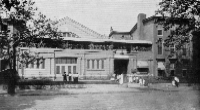 Because of these “unwholesome
influences,” Ingram and others worked
to establish supervised recreation
areas in Louisville. Most important
for this movement was the building of
playgrounds. By building supervised
playgrounds, Louisville’s activists
hoped to help children build “character
. . . through the
formation of ideals
and standards and
social adjustments
. . . which prepare
the individual for
later life.” Ingram
and her allies
intended to provide
a wholesome
atmosphere for
Louisville’s youth
and protect them
through supervision of their leisure activities.
Ingram’s correspondence and
the reports and articles she gathered
illustrate the goals of the recreation
movement in Louisville.
Because of these “unwholesome
influences,” Ingram and others worked
to establish supervised recreation
areas in Louisville. Most important
for this movement was the building of
playgrounds. By building supervised
playgrounds, Louisville’s activists
hoped to help children build “character
. . . through the
formation of ideals
and standards and
social adjustments
. . . which prepare
the individual for
later life.” Ingram
and her allies
intended to provide
a wholesome
atmosphere for
Louisville’s youth
and protect them
through supervision of their leisure activities.
Ingram’s correspondence and
the reports and articles she gathered
illustrate the goals of the recreation
movement in Louisville.
Often, the best way to avoid the lures of urban immorality was to leave the city. In Pewee Valley in the 1910s, Louisvillians established the Louisville Fresh Air Home, which served as a summer camp for Neighborhood House. Described as a “veritable haven of rest to the city’s tired mothers and a source of joy to their children,” the Fresh Air Home offered multiple weeklong programs during the summer that allowed mothers and children to escape the city. Each summer during the 1920s and 1930s, the Fresh Air Home hosted anywhere from five hundred to a thousand campers, who enjoyed opportunities for swimming, hiking, and other activities offered by the camp’s rural location.
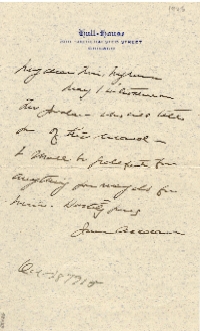 While Ingram and Neighborhood
House worked to assist immigrants
and to protect children, their mission
also included helping the community
at large. During the Great Depression, The settlement’s actions during the
1937 flood also demonstrated Neighborhood
House’s community outreach.
While much of the city lay under
water, Neighborhood House’s canteen
remained open and served meals to
flood refugees. Extensive correspondence
from early 1937 suggests that
Neighborhood House became a center
for the flood relief effort, receiving
donations from across the country.
While Ingram and Neighborhood
House worked to assist immigrants
and to protect children, their mission
also included helping the community
at large. During the Great Depression, The settlement’s actions during the
1937 flood also demonstrated Neighborhood
House’s community outreach.
While much of the city lay under
water, Neighborhood House’s canteen
remained open and served meals to
flood refugees. Extensive correspondence
from early 1937 suggests that
Neighborhood House became a center
for the flood relief effort, receiving
donations from across the country.
The Francis MacGregor Ingram collection provides an in-depth look at social reform movements in early-twentieth century Louisville and the United States. Because of Ingram’s local and national role in social organizations, her papers record the trajectory of many important reform campaigns from the 1900s to the 1950s. With correspondence from other social workers and social organizations, as well as reports, lectures, essays, and other materials, Ingram’s papers give researchers a window into the early social reform movements in Louisville as well as providing information on similar efforts across the United States.
The Filson Historical Society
1310 South Third Street - Louisville, KY 40208
Phone: (502) 635-5083 Fax: (502) 635-5086
Hours
The Ferguson Mansion and Office
Monday - Friday: 9 am. - 5 pm.
Saturday and Sunday closed
Library
Monday - Friday: 9 am. - 5 pm.
Saturday: 9 am. - 12 noon
